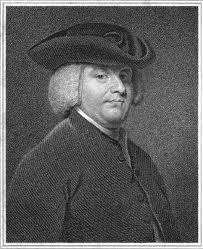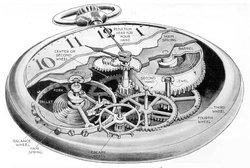 William Paley Image: Wikipedia Commons
William Paley Image: Wikipedia Commons Paley’s famous argument for the existence of God proceeds analogically, taking the idea of a watch, and making an analogy with the universe. Paley concludes that since the watch requires a watchmaker in order to exist, the universe must exist by virtue of some being capable of creating such a magnificent and intricately designed thing; God is the only suitable candidate for this.
Paley’s argument is a species of teleological argument. The word teleological is derived from the Greek word ‘telos’ meaning ‘end’ or ‘purpose’. Teleological arguments try to establish the existence of God by suggesting that the universe contains evidence of purpose which could only have been put there by God.
When we see certain effects in nature, it is reasonable to suppose that these effects have been produced by a particular type of cause. When we observe a snooker ball rolling along a table, for instance, it is usually reasonable to suppose that it has been caused to move by another ball or a snooker cue colliding with it, even if the cause itself was never seen (David Hume challenged this kind of thinking before Paley had even put pen to paper, but Paley seems unaware of his predecessor’s writing).
This type of argument is inductive: it proceeds from general premises to a specific conclusion. We know that complex objects having specific purposes are the product of intelligence, and teleological arguments apply this generalised fact to observable instances of complexity in the universe in order to establish that the universe was created by an intelligent being, i.e. God.
 Image: Wikipedia.Commons
Image: Wikipedia.Commons This tendency toward predictability bore an uncanny resemblance to the operation of human machines. Paley’s was an age in which engineering was advancing apace: from the large scale steam-ships and suspension bridges to large scale industrial mass-production to the minute world of mechanised automata, machinery and mechanisation seemed the very key to human advancement. These machines were designed by human beings who had specific purposes in mind, and designed the machines in such a way as to satisfy those purposes, making use of mechanisms that would produce predictable results and thus reliable machines. It would therefore seem compelling to suggest that evidence of predictability in nature suggested the existence of a designer who had a purpose in mind when it created the universe.
This was therefore the context of the argument in which Paley declared that if, in crossing a heath, he had struck his foot against a stone, he would not have wondered how it came to be there. After all, stones are not complex. They do not (superficially, at least) bear any marks of having been designed. But had he come upon a watch instead, Paley would have felt sure that the object had been designed by an intelligent being, due to its complex, intricate and purposeful nature.
Paley then went on to argue that if all the hallmarks of design present in the watch, they must also be present in the natural world. Paley gave the example that “the hinges in the wings of an earwig, and the joints of its antennae, are as highly wrought, as if the creator had nothing else to finish.” The characteristics that denote carefulness of design in man-made objects are present in the universe.
Not only are the hallmark complexities of design present in nature, but in Paley’s words are more evident in nature than in the watch “to a degree which exceeds all computation”. Paley thus concludes that God possesses not only the characteristics of a human designer, but an infinite degree of care and attention to detail. Not only does Paley’s argument thus claim to establish the existence of any deity, but an omnipotent and omnibenevolent God.
Paley’s argument builds on Aquinas’ argument before his. For Aquinas, the universe shows evidence of God’s design because of regularity: in Aquinas’ terms, “bodies that lack knowledge … act for an end, and this is evident in their acting always, or nearly always in the same way, so as to obtain a result.” Paley’s argument depends on a similar thesis of regularity, but (in keeping with the time of his writings), he expands this to encompass ideas of complexity as well. An examination of the watch’s workings reveals complexity that explains why it works with regularity when it is in motion.
This means that Paley can anticipate his critics by pointing out that if the watch failed to keep time exactly, that would not nullify the evidence of design found in it. The high degree of complexity and the fact that this aims at a function, even if that function is not fully achieved, still counts as strong evidence of design. Therefore even if things in the world do not always function perfectly, such as potatoes being wiped out by blight, and animals going extinct this does not nullify the evidence of design to be found in the complexities of the potato plant’s biological workings. The greatness of designed complexity to be seen in nature points to God’s existence even if its intended function is not always achieved.
There are of course many who dismiss the Teleological argument as fanciful, overly positive about the purpose of the world and simply wrong. As Darwin proposed and Dawkins & Dennett would later argue, the world is not designed with a purpose in mind, rather it is that we perceive order and purpose when there is none. But if you want to learn about these criticisms you will have to wait for another word of the week...






 RSS Feed
RSS Feed
